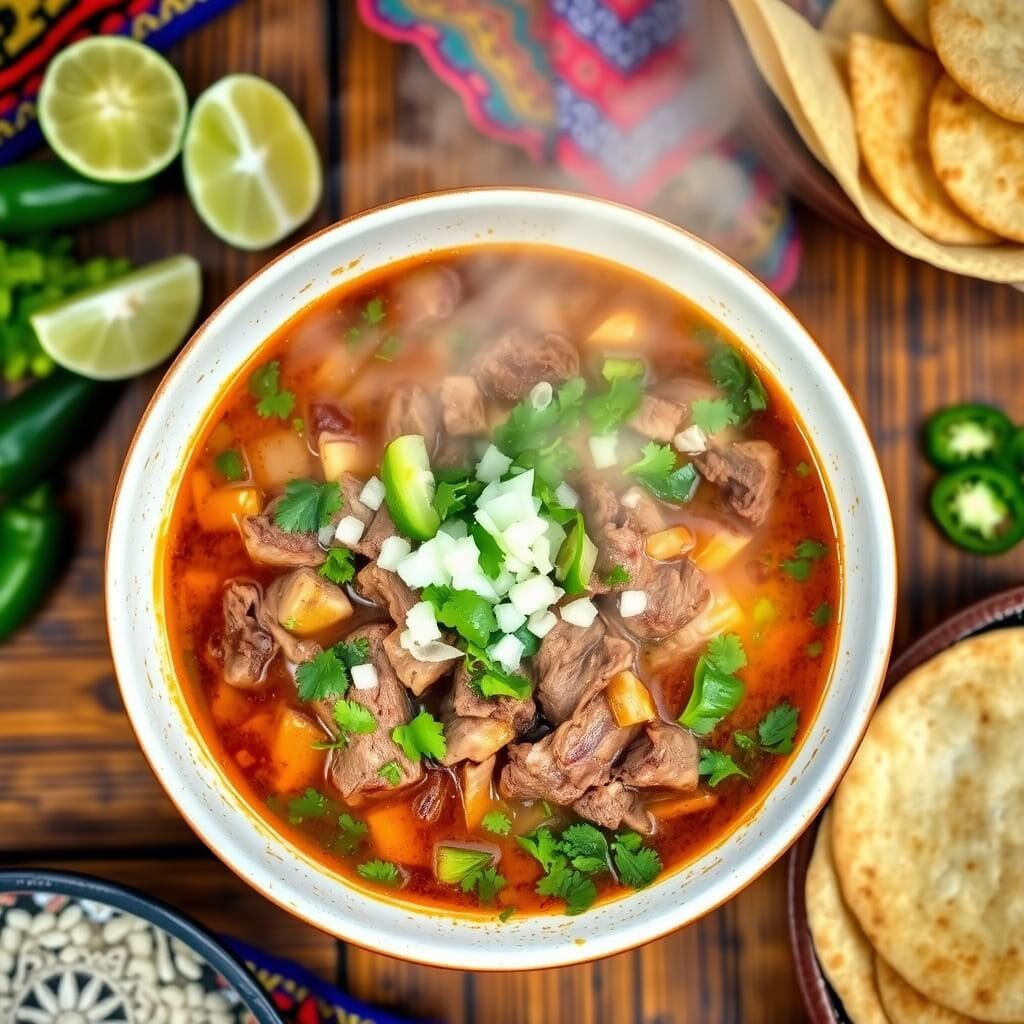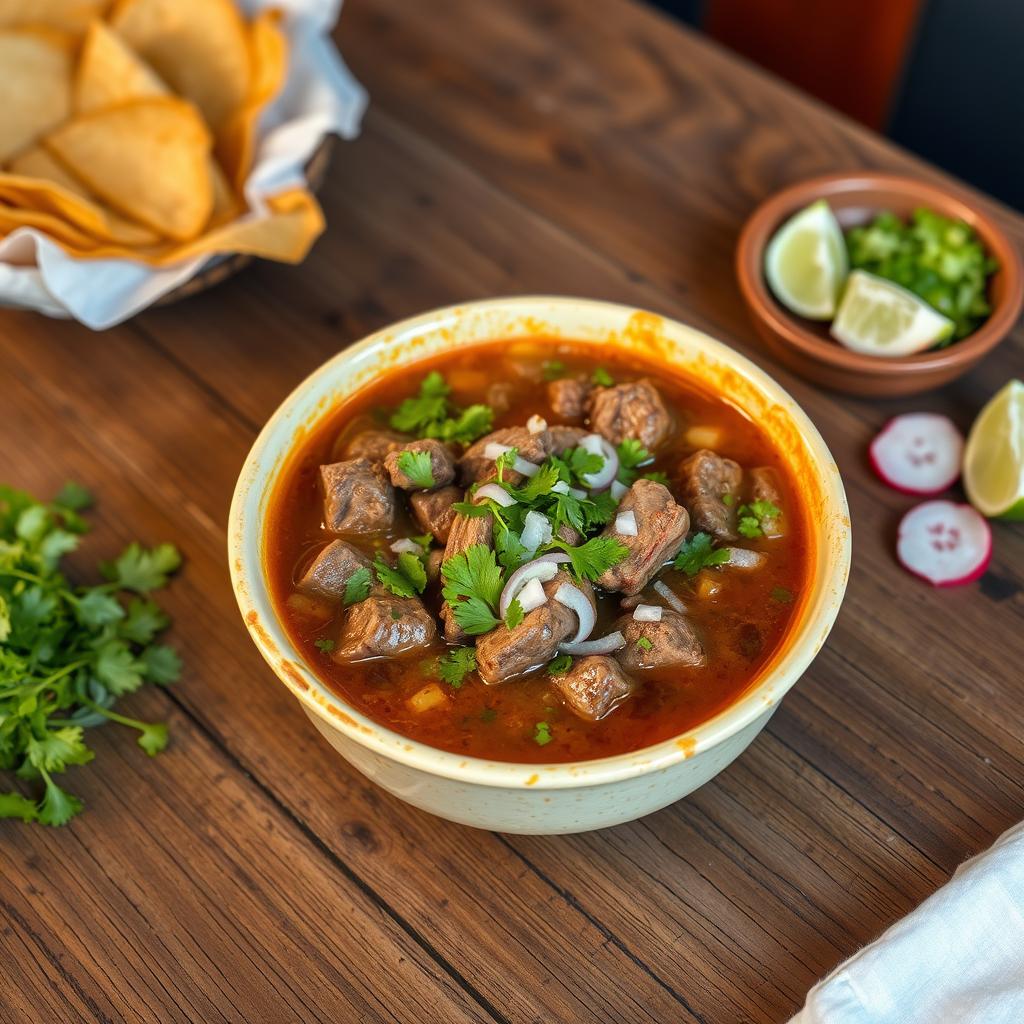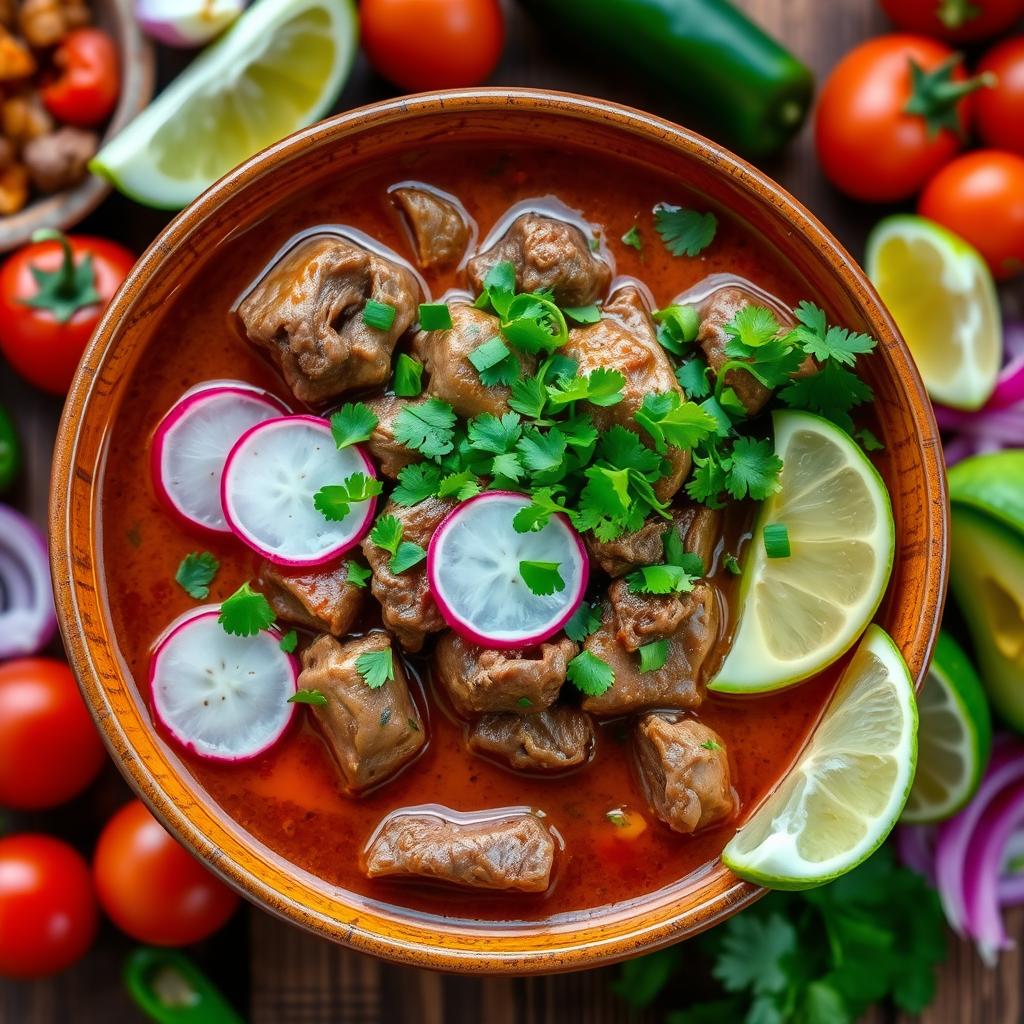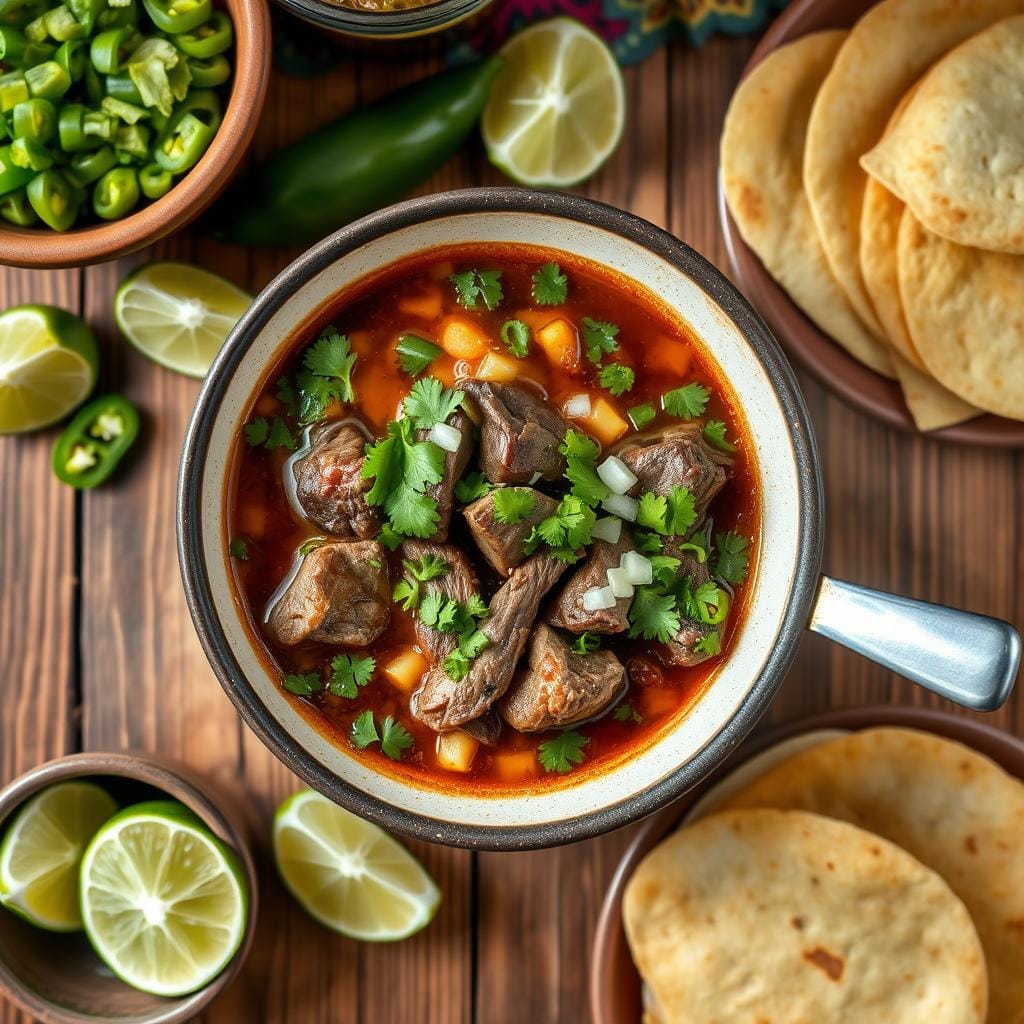Walking into my grandmother’s kitchen, I was hit with the smell of spices and beef. It took me right back to my childhood in Guadalajara, Mexico. Carne en su Jugo, a dish I love, is more than just food to me. It’s a tradition that connects me to my roots. Join me as we dive into the world of this iconic Mexican beef stew.
Carne en su Jugo, or “meat in its own juices,” comes from Guadalajara, Jalisco. It’s a hearty stew that shows off Mexico’s rich food culture. With every bite, you’ll taste the perfect mix of spices, tender beef, and savory broth. It’s a dish that will make you want more.

Key Takeaways
- Carne en su Jugo is a traditional Mexican beef stew with roots in Guadalajara, Jalisco.
- The dish is known for its tender beef cooked in a flavorful broth made with a blend of spices.
- Carne en su Jugo is a cherished part of Mexican culinary heritage and culture.
- Preparing this dish authentically requires specific ingredients and cooking methods.
- Exploring carne en su Jugo offers a delicious way to connect with the flavors of Mexico.
Understanding Carne en su Jugo: A Mexican Culinary Treasure
Carne is more than a Mexican beef stew. It’s a culinary treasure that shows the rich heritage and vibrant flavors of Mexico. This comida típica comes from Jalisco, a state known for its traditional recipes and diverse Mexican cuisine.
Origins from Jalisco’s Traditional Kitchen
Carne started in Jalisco’s busy streets and home kitchens. Local cooks mixed indigenous ingredients with Spanish cooking styles. This dish’s unique taste and traditional cooking methods honor Jalisco’s culinary traditions.
Cultural Significance in Mexican Cuisine
Carne en su Jugo is not just tasty; it’s also culturally significant. It shows the mix of different culinary traditions in Mexico. As a beloved comida típica, it brings pride and inspires cooks across the country.

“Carne en su Jugo is not just a dish, but a testament to the rich cultural heritage and culinary artistry of Mexico.”
Essential Ingredients for Authentic Carne en su Jugo
Making the perfect carne en su jugo, a traditional Mexican beef stew, needs the right ingredients. You’ll need tender carne de res (beef) and a mix of herbs and spices. Each part is crucial for the dish’s unique taste.
The heart of this famous estofado de carne (beef stew) is the beef. A mix of carne de res (beef) and beef bones gives it a rich flavor. The beef is seared to keep its juices in and add more taste.
- Beef Cuts: Flank steak, chuck roast, or brisket are popular choices for their tenderness and flavor.
- Beef Bones: Marrow bones or oxtails add essential collagen and minerals to the broth.
Bacon is also a key part of carne en su jugo. Its fat adds depth and a smoky flavor to the stew.
Tomatillos add a tart and sweet taste. They balance the beef’s richness. Herbs like epazote, cilantro, and cumin add more flavor.

Finally, frijoles de olla (boiled beans) are added. They add texture and flavor to the guiso de carne (meat stew).
“The perfect carne en su jugo is a harmonious symphony of flavors, where each ingredient plays a vital role in creating a truly authentic Mexican culinary experience.”
Traditional Cooking Methods and Techniques
Making the perfect carne en su jugo, a favorite Mexican beef stew, is a tradition. It needs a deep understanding of cooking methods and techniques. Each step, from preparing the meat to making the broth, is key to its authentic taste and texture.
Proper Meat Preparation
The base of a great carne guisada is the beef. It should be trimmed and cut into small cubes. This makes the meat tender and flavorful.
Creating the Perfect Broth
- Start by sautéing onions, garlic, and tomatoes in a big pot. This creates the broth’s base.
- Add the beef cubes and let them brown. This locks in their juices and flavor.
- Then, pour in beef or chicken stock and Mexican spices like cumin and chili powder.
- Let it simmer for hours. This blends the flavors and makes the beef tender.
Cooking Time and Temperature Control
The secret to carne en su jugo‘s perfect texture and flavor is in the cooking time and temperature. Simmering it low and slow breaks down the beef’s collagen. This makes it tender and juicy. It’s important to keep the heat low to avoid tough meat.
“The true essence of carne en su jugo lies in the harmonious balance of the meat, broth, and traditional Mexican spices – a culinary dance that has been perfected over generations.”
Regional Variations of Mexican Beef Stew
The traditional carne from Jalisco is a favorite platillo de res. But Mexico’s diverse culinary scene offers many regional takes on this comida típica or traditional estofado de carne. Each state and city adds its own twist, showing the rich variety of Mexican food.
In Chihuahua, the carne gets a spicy kick from taco sauce. Veracruz’s version adds fresh seafood like shrimp or fish, blending land and sea flavors.
- In Yucatán, the carne gets a vibrant red flavor from achiote spice.
- Oaxaca’s carne en su jugo is famous for its mole sauce, a mix of chiles, spices, and chocolate.
- Tabasco’s carne is known for its fiery taste, thanks to the state’s hot chili peppers.
These regional twists on carne en su jugo show Mexico’s culinary diversity and the dish’s lasting appeal. Whether you like it spicy, seafood-rich, or mole-flavored, exploring these variations is a tasty journey through Mexico’s food heritage.
Selecting the Best Cuts of Beef for Your Stew
Choosing the right beef is key to making a great carne. The right cut can change the texture and taste of this platillo mexicano. Let’s look at the top beef cuts and how to pick the best meat for your guiso de carne.
Prime Beef Cuts Options
For the best carne, pick these top beef cuts:
- Chuck Roast: This cut from the shoulder is tender and full of flavor when slow-cooked.
- Brisket: Its rich taste and tender texture make it perfect for long-cooked stews.
- Short Ribs: These ribs add a luxurious touch to your stew with their flavor and tender texture.
Meat Quality Indicators
To choose the best carne de res for your carne en su jugo, look for these signs:
- Marbling: Beef with even fat inside is juicy and full of flavor.
- Color: Choose beef that’s bright red, showing it’s fresh and aged right.
- Texture: The meat should feel firm and have a smooth, velvety feel.
Following these tips will help you make a delicious carne en su jugo. It will be a true taste of Mexican cooking.
Perfect Side Dishes and Garnishes
The classic cocina mexicana dish, carne en su jugo, shines with the right side dishes and garnishes. This traditional receta tradicional needs a mix of flavors and textures to match the savory beef stew.
Start with fresh, vibrant ingredients to garnish your carne en su jugo. Chopped cilantro adds a bright, herbaceous flavor. Thinly sliced white onions and radishes bring a refreshing crunch. A squeeze of lime wedges adds a nice acidity.
For a complete meal, pair carne en su jugo with classic comida típica sides. Consider:
- Steaming white rice to soak up the rich broth
- Warm, freshly made tortillas for wrapping and dipping
- A simple salad of mixed greens, diced tomatoes, and tangy vinaigrette
These sides not only improve the taste and texture of carne en su jugo. They also make the meal look and feel like a true cocina mexicana experience.
| Side Dish | How it Complements Carne en su Jugo |
|---|---|
| Steamed White Rice | Absorbs the rich, flavorful broth |
| Warm Tortillas | Provides a vessel for wrapping and dipping |
| Mixed Green Salad | Adds a refreshing, tangy contrast to the stew |
| Chopped Cilantro | Lends a bright, herbaceous note to the dish |
| Sliced Onions and Radishes | Provide a crunchy, refreshing texture |
| Lime Wedges | Contribute a zesty, acidic element |
Choosing the right side dishes and garnishes can turn your carne en su jugo into a memorable cocina mexicana experience.
Health Benefits and Nutritional Value
Carne, a favorite Mexican beef stew, is not just tasty. It’s also packed with nutrients. This platillo de res is full of protein and minerals, making it a healthy meal option.
Protein and Mineral Content
The beef is the main ingredient in carne en su jugo. It’s a great source of protein, helping your body stay strong. The beef also has important minerals like iron, zinc, and selenium. These minerals help your immune system, energy levels, and overall health.
Balanced Meal Components
- Carne also has fresh veggies like onions, garlic, and cilantro. These add vitamins, minerals, and antioxidants, making the meal balanced and nutritious.
- The broth in the dish is full of flavorful juices. It adds a nourishing essence to the stew.
- Enjoying carne en su jugo in moderation can be a great addition to a healthy diet.
Try carne en su jugo for its delicious taste and health benefits. It’s a tasty and nutritious choice for your meals.
Serving and Presentation Tips
When serving carne en su jugo, how you present it matters a lot. This dish from cocina mexicana should be shown with care and detail.
Here are some tips to make your carne guisada experience better:
- Use deep, wide bowls to serve the stew. This lets the broth and tortillas or bread mix well.
- Add fresh cilantro, diced white onion, and lime juice on top. It adds flavor and color.
- Put out toppings like radishes, avocado, queso fresco, and hot sauce. Let everyone make their dish their way.
- Pair the stew with a Mexican drink like agua fresca or michelada. It makes the meal complete.
By focusing on presentation and serving, you bring the cocina mexicana to your guests. It makes for a memorable carne guisada experience.
“Carne en su Jugo is not just a dish, it’s a culinary celebration of Mexican heritage and tradition.”
Conclusion
the authentic Mexican beef stew, is a true culinary treasure. It captures the essence of Mexico’s vibrant food culture. This beloved platillo mexicano has deep roots in Jalisco’s traditional kitchens.
It has been lovingly prepared for generations using time-honored receta tradicional. The succulent beef, flavorful broth, and aromatic spices make carne a dish that tantalizes the senses. It celebrates the rich heritage of Mexican cuisine.
Whether you choose to recreate this masterpiece in your own kitchen or seek out an authentic version at a local restaurant, you’ll be embarking on a journey. This journey connects you to the heart and soul of Mexico’s culinary legacy.
As you savor each bite, let the flavors transport you to the vibrant markets and bustling streets of Mexico. The aroma of this beloved dish has long been a cherished part of the cultural fabric. Embrace the opportunity to experience the depth and diversity of Mexican cuisine.
Let carne inspire you to further explore the rich tapestry of this remarkably flavorful and enduring culinary tradition.

